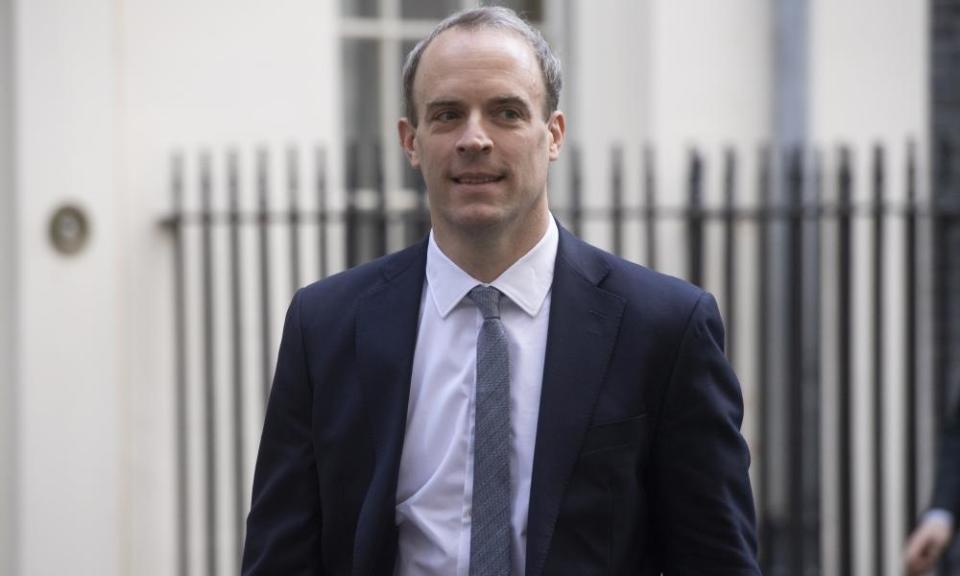Dominic Raab says legislation is needed to cut UK aid spending

The foreign secretary has decided legislation is required to cut the aid budget since the current fiscal uncertainty means the government may feel obliged to miss the commitment to spend 0.7% on gross national income on overseas aid for longer than a year.
Legislation would be laid, Dominic Raab told MPs in an oral statement, but did not give a date for doing so. The Foreign Office has indicated it is unlikely to be introduced until the second half of next year.
Telling MPs the government would be open to legal challenge if it did not introduce legislation, Raab said: “We have taken legal advice on this. It is very clear that if we cannot see a path back to 0.7% in the immediate foreseeable future then the legislation would be required.”
He added the government’s proposals did not meet the limited derogation allowed in the legislation to miss the 0.7% target inadvertently.
Tory backbench MPs continued to mount resistance to the plans, with the chair of the foreign affairs select committee, Tom Tugendhat, proposing ministers put in a sunset clause in the new legislation to provide a cut-off date by which the 0.7% target will be achieved.
The requirement to pass fresh legislation could give Tory MPs an opportunity to mount a rebellion, and force a government retreat on plans to cut the aid budget to 0.5% of gross national income (GNI) as laid out by the chancellor, Rishi Sunak, in the spending review on Wednesday.
Allies of Andrew Mitchell, a former chief whip who is leading the rebellion, say he has already gathered close to 40 rebels, with another 30 possible.
Mitchell said: “With Joe Biden in the White House, this is a dismal start to the British chairmanship of the G7, and UN climate change conference. The 0.7% was not just one commitment, it was a commitment to the poor made by every single member of the Commons at the last election, apart from the DUP. This is about Britain’s leadership role in the world.”
One source said: “This is the wholesale destruction and dismantling of the British development architecture by Boris Johnson. First he dismantled the Department for International Development, and now he is going after the money. He cannot say when he will bring the 0.7% target back because he has no intention of bringing it back. The government thought they could do all this without legislation, but because this is a premeditated to destroy 0.7%, they have realised the law will have to be changed, or repealed altogether.”
The cut to 0.5% of GNI will mean the aid budget is cut by about a third, down to £10bn next year. The plan has led to a storm of protest from former prime ministers, aid groups and Tory MPs worried that the UK’s reputation as a global player will be threatened just as it takes on the chairmanship of the G7 and hosts the UN climate crisis summit.
Related: 'We made a promise': fallout from UK's cut in overseas aid remains to be seen
Raab told MPs: “The International Development (Official Development Assistance Target) Act 2015, the bill that enshrines meeting the target of 0.7% in law, envisages circumstances in which the target may not be met, in particular in the context of economic pressures.”
He added: “Given that we cannot at this moment predict with certainty when the current fiscal circumstances will have sufficiently improved, and our need to plan accordingly, we will bring forward legislation in due course.”
Speaking on BBC Radio 4’s Today programme on Thursday, Sunak emphasised the existing law entrenching the 0.7% target, passed in 2015, allowed for ministers to temporarily shelve the target. But the act arguably only gives ministers leeway to miss the 0.7 % target for one year.
He said: “The existing legislation that we have for the aid target specifically allows for the fact it may not be possible in certain circumstances to meet the aid target and that is contained in the existing legislation as it is.”
The act asserts that if the secretary of state is unable to reach the 0.7 % target, he or she is required to explain to parliament why the target has not been met, and if relevant refer to the economic circumstances and any change in gross national income, fiscal circumstances in particular, and the likely impact of meeting the target on taxation, public spending and borrowing.
The secretary of state is then required to set out what steps they will take to meet the target in the next year. Sunak on the BBC refused to set a date by which the target would be restored, saying only that the change was not permanent and spending would rise back to 0.7% “when fiscal circumstances allow”.
Since the act requires a commitment to return to 0.7% within a year, and ministers do not feel able to make that commitment, legislation revising the 2015 act may be required.
The act stresses that the minister’s accountability is solely to parliament, blocking off some legal options such as judicial review.
Raab said the aid budget would be dedicated to tackling the climate crisis, Covid, girls’ education and poverty alleviation. He did not specify any areas where the aid budget would be cut.
Reflecting public support for the aid cut, Sunak said: “We made a choice yesterday to prioritise people’s jobs, public services and helping the country get through coronavirus. I think it is a choice the British people will support.”

 Yahoo Movies
Yahoo Movies 